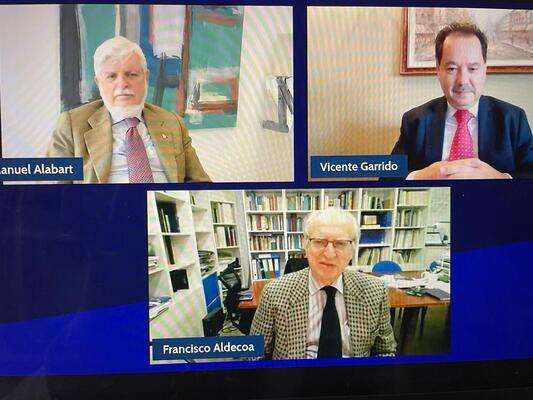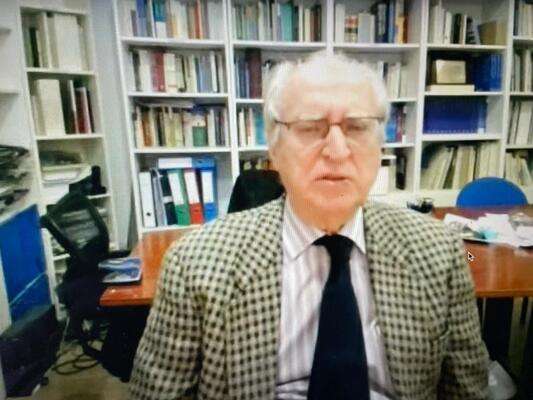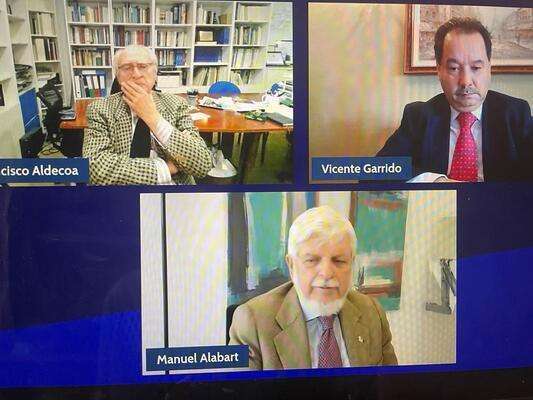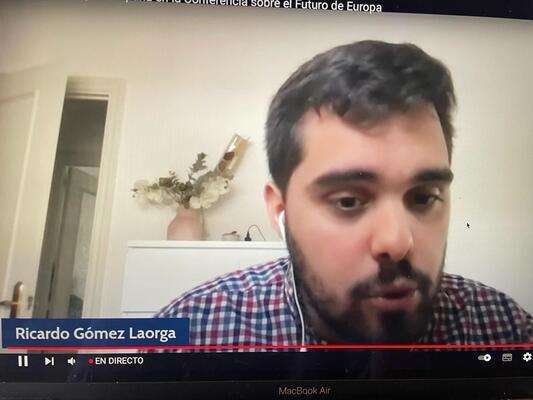Francisco Aldecoa: "The Conference is not going as well as we had hoped"

The future of the European Union continues to be debated. As part of this process, the Conference on the Future of Europe is trying to make its mark as a means by which, through the participation of citizens and non-governmental organisations, it can contribute ideas and proposals on the future of the Union at a time when Europe is going through a critical situation on the international stage.
For this reason, and in order to continue trying to inform the public about the role of the Conference in this area, the President of the European Movement in Spain, Francisco Aldecoa, addressed various issues at an event organised by INCIPE. Under the title "repercussions for Spain in the Conference on the Future of Europe: an opportunity and a concern", Aldecoa tried to show what have been the strengths and weaknesses that have marked the Conference from its birth until today.

The event was presented by the Secretary General of INCIPE and Ambassador of Spain, Manuel Alabart, and moderated by the Director General of INCIPE, Vicente Garrido. In addition to the presence of Francisco Aldecoa, the event was attended by the representative of young Europeans, Ricardo Gómez Laorga, and the member of the European Movement and international law expert, Gemma Bedia Bueno.
To begin with, he pointed out that this "is a fantastic opportunity to be able to explain how the Conference is going and how it works. Very little has been reported in the media on this issue and it is very little known, as well as its development, which is why I would like to take this opportunity to explain how the Conference has developed over the years".
The President pointed out that "the conference has not gone as well as we had hoped. A profound opportunity for European change, such as this one, which is made up of representatives of institutions, citizens and representatives of civil society, has not had the media coverage that we would have liked and has experienced a series of problems that need to be tackled".
At present, he continued, the Conference proposes several "profound changes" because "we are in a process of a new European cycle that begins with the European Parliament elections in 2019 due to the fact that participation has increased by almost 10 points. The legitimacy of the whole process has increased". However, "the Commission has had to face an issue that was not foreseen: the pandemic".

Even so, a number of achievements have been made, since "it is the first time that a fund has been distributed according to needs, not according to GDP or population, but according to needs. Spain has been able to benefit from 150 billion, a very important investment. A federal decision that links all the institutions, through 750 billion European funds, the Next Generation Fund".
He explains that these funds have been directed "to create jobs for young people and they are the ones who in the end, 30 years later, will end up repaying this debt. There is a growing awareness of how this debt is going to remain as part of the European treasury that is going to be created".
He added that thanks to the Commission "these two years we have managed to deal with economic, political and social aspects". He gave as an example of a federal measure the plan to distribute European vaccines and the implementation of the COVID passport, which "was done in record time in one month".

"We are in an open process in which the need for the Conference arises, proposed in 2019 by President Macron, assumed by Von der Leyen, and he has managed to make open proposals for the reform of the treaties and has emphasised the role that young people play in the Union", he declares.
However, he regrets that "this proposal did not go quite as planned. In 2020 it could not be implemented because of the pandemic," but he stressed that this was not the main reason because "there has not been good communication between the institutions".
He confesses that there are "difficulties in the functioning of the Conference as it is very difficult for a secretariat to function when there are three heads, there is no clear and unique leadership. The conference has had three plenary sessions in one year. The first difficulty is the delay in the functioning because there is not enough clarity and understanding between the three presidents".
In addition, he adds that there are "delay and organisational problems" because in the end the Conference is made up of "three quarters institutions and one quarter the rest. There are eight seats for civil society" and he denounced the fact that "citizens' representatives are chosen by lot, as is done in the polls, so they do not have much legitimacy". In addition, there are "nine working groups, eight of which are chaired by representatives of the institutions and not civil society".
As for the usefulness of the conference, Aldecoa affirms that "proposals will come out of it, but we don't know how far they will go". On the other hand, he assures that "Spain is one of the countries that will benefit the most", as it has more possibilities to take advantage of initiatives such as "the green pact and to incorporate the reform of the areas of empty Spain, the same in relation to health and the social pillars".
He concluded by pointing out that "it is a question of taking up the things that have been done in the face of a need".
The representative of the young Europeans, Ricardo Gómez Laorga, also spoke, emphasising the importance of "composing a European Union of health". He also praised "the commitment of young Europeans to the Conference, and the events are an example of this".

He pointed out that "the role that young people should play at the conference, especially given that we are in the European Year of Youth, is one of direct participation, not only in the actions that most concern young people, but also in being able to respond to the challenges facing the EU".
For this reason, he added, "we have produced memoranda in which we have launched proposals that we believe should be addressed at the Conference, such as the need to increase the representation of young people", a sector that represents 25% of the demographic and which has a representation of 12% in the plenary.
Finally, he concluded by denouncing "the lack of attention paid by the media to the subject of the Conference", which is a delay, since "good and correct media support makes public opinion aware of the subject and gives it an opinion".
To conclude, Gemma Bedia Bueno, an expert in international law and member of the European Movement, added that what young people want with the Conference is "to present our proposals on how we want the EU to be", but this has had a series of obstacles in this area, such as "a low representation of young people at the conference and also of civil society (...) we have felt that we have not been listened to enough".








